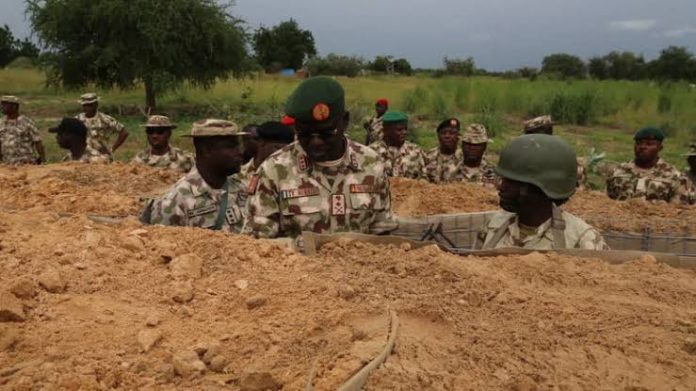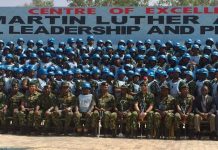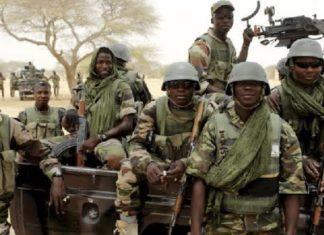A report by the Centre for International and Strategic Studies (CISS) has revealed how the Chief of Army Staff (COAS), Lt. Gen. Tukur Buratai’s presence in the Northeast for two months triggered a monumental turnaround in the fight against Boko Haram/ISWAP.
Co-signed by its Chancellor, Prof. Ahmed Danfulani and Senior Research Fellow, Dr Samson Bello, the Centre said the COAS’ relocation to the theatre of operations provided the much-needed morale booster for the troops to edge closer to victory.
According to CISS, the result is evident as over 250 insurgents have surrendered voluntarily due to immense offensives by the troops while no fewer than 1,200 lost their lives to the Nigerian Army’s superior firepower.
It added that 600 women and children have been freed from Boko Haram captivity, thanks to the renewed commitment by the Army in its well coordinated onslaught led by the Chief of Army Staff himself.
The Centre, however, urged the COAS and his troops to sustain the momentum, adding that the war against terrorism would end in no distant time.
Read full report below:
Introduction:
The Centre for International and Strategic Studies in its documentation of the Boko Haram war in Nigeria for reference and research purposes has been undertaking bi-monthly reports on the war against terrorism and the operations of the Nigerian Military in North-East Nigeria.
This report is designed to be encompassing to reflect the various aspect of the war as well as the commitment from the Nigerian Military in the prosecution of the war, the commitment of the political leadership in the country, the commitment of the International Non-Governmental Organizations, as well as the commitment of humanitarian agencies and the interventionist agencies.
The War against Terrorism in North-East Nigeria:
The Boko Haram crisis in Nigeria assumed a violent dimension in 2009 when the group began its violent campaign against the Nigerian state. From 2009 to date, the number of casualties has been mind-boggling that has resulted in the death of hundreds of thousands, and as well as the displacements of millions of people in North-East Nigeria.
Successive administrations in Nigeria from 2009 indeed introduced measures to counter the threats posed by the Boko Haram insurgent group. However, the group continued to gain popularity amongst the youthful population of North-East Nigeria, which indeed translated to a swell in their ranks.
The Boko Haram group gained affiliations to terrorist networks outside Nigeria, and this saw to an increment in their sophistication in terms of operational style, the sophistication of their arms and ammunition, war tanks and technical know-how in the entrenchment of violence across not just North-East Nigeria, but in Nigeria as a whole as the other parts of the country witnessed Boko Haram attacks continuously.
The Federal Capital Territory of Nigeria was not spared as critical government infrastructures came under the attack of the Boko Haram group, including schools, places of worship, motor parks, the headquarters of the Nigerian Police Force, the headquarters of the United Nations in Nigeria and other areas of public concerns. There was also incessant cases of suicide bombings that resulted in the deaths of innocent people across the divide in Nigeria.
The Boko Haram group also resulted in the kidnapping of schoolboys and girls from their dormitories which attracted global condemnation. The activities of the Boko Haram group festered due to the lack of political commitment from the authorities who viewed their activities as propaganda.
How the Nigerian Military has sustained the War Against Terrorism:
The Nigerian Military has continued to sustain war against the threats posed by the Boko Haram group through a combination of factors. The coming of the administration of President Muhammadu Buhari in 2015 proved to be the game-changer in the war against Boko Haram terrorism in Nigeria.
This political will exhibited by the administration was manifest in the overhauling of the security apparatus in the country starting with the appointments of new Service Chiefs, the relocation of the military command from the Federal Capital Territory to Borno State, as well the reequipping of the Military with modern-day arms and ammunitions to confront the Boko Haram terrorist group.
In 2016, the Nigerian Military gained ascendency over the Boko Haram group with the capture of its operational headquarters in Sambisa Forest, as well as the capture and killing of some of its key commanders in the various operations carried out by the Nigerian Military.
The Nigerian Military also recaptured the over 16 local government areas hitherto under the control of the Boko Haram group. This feat was achieved through the combined efforts of the various security agencies with support from the political authorities at the federal and state levels in Nigeria.
This trend continued till date with the Boko Haram group restricted to the fringes of the Lake Chad Basin region from where they regroup and launch attacks in Nigeria. It is succinct to state that the Nigerian Military has indeed displayed acts of bravery in reducing the threats posed by the Boko Haram group in Nigeria to the barest minimum through laudable initiatives as well as the professionalization of its operations in line with the rules of engagement in warfare.
The role of the various Service Chiefs in the coordination and persecution of the war against terrorism has been outstanding, and this has resulted in the multiple gains recorded so far. The various rescue operations carried out by the Nigerian Military has seen to the rescue of hundreds of thousands of women and children as well as elderly ones held captive by the Boko Haram group.
There has also been lots of emphasis on the welfare of the troops by the military authorities. This fact is partly responsible for the renewed vigour in the prosecution of the Boko Haram war by the Nigerian forces.
Timeline of Events/Successes by the Nigerian Military in the War Against Terrorism in Nigeria:
The Nigerian Military has indeed made considerable gains in the War against terrorism in Nigeria. From the reports gathered in the field, it can be stated the from 2016 to date; the Nigerian Military was able to redefine the War against Terrorism in Nigeria by ultimately rendering the Boko Haram group ineffective and confined to their hideouts in the fringes of the Lake Chad Basin Region.
In the last two months, the gains recorded are phenomenal with the relocation of the Chief of Army Staff, Lt. Gen. Tukur Buratai to the theatre of operations in North-East Nigeria. The number of terrorist that surrendered in the last two months stands at a figure of 250, while those killed by the Nigerian Military stands at over 1200 in the past two months of intensified military operations led by the Chief of Army Staff in North-East Nigeria.
In the last two months, the various rescue operations of the Nigerian Army has led to the rescue of over 600 women and children from Boko Haram captivity spread across multiple locations in North-East Nigeria. This feat was as a result of the renewed commitment by the Nigerian Army in its onslaught against the Boko Haram group that was coordinated by the Chief of Army Staff.
The presence of the Chief of Army Staff in the theatre of operations has indeed boosted the morale and operational effectiveness of the Nigerian Military in North-East Nigeria. The troops have been continually engaging the Boko Haram group, and this has led to scores of overtures made by the Boko Haram fighters signifying their willingness to dialogue for a ceasefire.
Recommendations:
The routine presence of the Chief of Army Staff in the theatre of operations in North-East Nigeria, which had been a significant strategy of the Nigerian Army leadership has shown a significant impact on the war against Boko Haram insurgency in North-East Nigeria. This must be sustained as a culture and spread across the whole armed forces and security apparatus in Nigeria.
The precarious situation that Nigeria has found herself demands that all state actors must take the welfare of their personnel seriously and must be in the trenches with the troops providing psychological support using the example of the Chief of Army Staff and the Nigerian Army.
It must be stated that if the leadership of other security agencies take a cue from the Nigerian Army experience, the myriads of security challenges would be nipped in the bud. If the Inspector General of Police moves in with its personnel in the forest combing for bandits and other criminal elements, there would be a significant improvement in the security situation in the country.
If the Comptroller General of Immigration occasionally mans the borders with its officers would reduce incidences of smuggling and other trans border-related crimes in the country.
There is a need for greater synergy between the local political leadership and the Military. This has been seen from the constant collaboration between the Military and the current political leadership in northeast Nigeria.
This cordial relationship has helped to eliminate mistrust between the Military and the political leadership which worked to the advantage of the terrorists in the past. Therefore there is a need for a deliberate effort by the political leadership in conjunction with the Nigerian Police and the Department of State Security to take control of recovered territories in North-East Nigeria to return life to the communities and make it impossible for fleeing terrorists to regroup against the Nigerian state.
Interventionist agencies in the North-East must speed up developmental activities to help the populace in bouncing back to life by providing the needed infrastructures that would encourage the displaced people to return to their communities.
Conclusion:
The operations of the Nigerian Military in North-East Nigeria can be described as effective in curtailing the various threats posed by the Boko Haram terrorist group. The various rescue operations that have led to the release of several women and children held in captivity by the Boko Haram group lends credence to the strategic importance of the role of leadership in the War against terrorism in Nigeria.
The example by the Chief of Army Staff is indeed a worthy example that must be emulated by heads of security agencies in the country in ensuring that our officers and men are in high spirits in pursuant of the task of maintaining law and order in the country.
It is, therefore, the considered opinion of the Centre for International and Strategic Studies that the gains recorded by the Nigerian Military in the War against terrorism in Nigeria is strategic and in line with global best practices that emphasizes teamwork, patriotism, dedication and zeal. These are all the hallmark of the leadership of the Nigerian Military since 2015.
We wish to state that if this momentum is sustained, Nigeria would win the war against terrorism in no distant time.
Join Television Nigerian Whatsapp Now
Join Television Nigerian Facebook Now
Join Television Nigerian Twitter Now
Join Television Nigerian YouTUbe Now

























